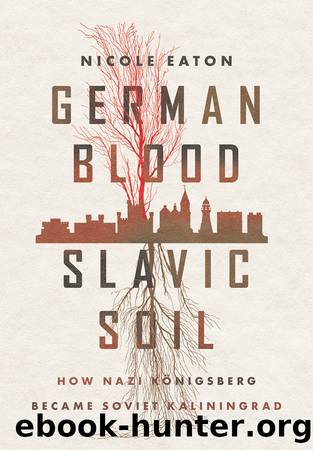German Blood, Slavic Soil by Nicole Eaton;

Author:Nicole Eaton;
Language: eng
Format: epub
Publisher: Lightning Source Inc. (Tier 3)
Published: 2023-06-15T00:00:00+00:00
The Struggle over Space and Time
The Red Army had arrived as an army of conquest, but in establishing an occupation, it found itself called on to assume the role of the state. After the first weeks of interrogations, the Red Armyâs pressing task was to rebuild the devastated city and countryside. They sought to do so in large part to contain the epidemic contagion, which threatened the lives of the German population and increasingly the lives of the Red Army soldiers and officers themselves. Because Germans constituted virtually the entirety of the population and the primary workforce, the tasks of rebuilding the city and rescuing the Germans from death proved to be inseparable. Success depended on the Soviet occupiersâ ability to assert control as quickly as possible over the collection, production, and distribution of the cityâs remaining resources. This process of Sovietization became a battle for the mastery over time and a struggle to assert control over space. Yet the militaryâs efforts to rebuild and improve living conditions were constrained by the regionâs ongoing privation and its geographic and administrative isolation. Practices of Sovietization utterly transformed Königsberg in the first year after the war. But Königsberg started to become Soviet less so in response to the military occupationâs plans, and more so in organic and pragmatic response to constant crisis.
The military governmentâs greatest struggle was to nationalize the cityâs remaining resources. The most valuable and urgently needed of these, by far, was food. Hunger had already plagued the Soviet home front for years: the Soviet Union was the only major combatant to face mass starvation mortality during the war, in large part due both to the loss of agricultural lands to the German occupation and the extreme, long-term mobilization of the home front to produce supplies for the defense.68 When Fortress Königsberg fell on April 9, 1945, the Red Army issued orders immediately to collect the cityâs remaining stockpiles and Wehrmacht supplies. By mid-April, it established the first rations for the German and Soviet population of the conquered territory. The Soviet state had developed a complex wartime ration system designed to feed Soviet soldiers and civilians, structured around basic hierarchies of allocation: soldiers at the front were fed better than civilians in the rear, and provisions were based roughly on a labor principle of caloric expenditure.69 The Special Military District adopted a similar practice at the end of the war. The number of calories and types of food varied by groupâGerman POWs, injured soldiers in hospitals, German civilians, and Soviet citizens all had different rationsâbut the main determinant for the number of calories was based not on being German or Soviet, but according to the difficulty of labor. Construction workers, no matter their nationality, were slated to receive more food than those working less strenuous labor, and certain groups of Soviet citizens and former forced labor repatriates, along with German POWs and civilians working under direct Red Army command, were slated to be fed according to the Third Norm, the militaryâs standard rations for noncombat troops.
Download
This site does not store any files on its server. We only index and link to content provided by other sites. Please contact the content providers to delete copyright contents if any and email us, we'll remove relevant links or contents immediately.
| Anarchism | Communism & Socialism |
| Conservatism & Liberalism | Democracy |
| Fascism | Libertarianism |
| Nationalism | Radicalism |
| Utopian |
The Secret History by Donna Tartt(18188)
The Social Justice Warrior Handbook by Lisa De Pasquale(11957)
Thirteen Reasons Why by Jay Asher(8461)
This Is How You Lose Her by Junot Diaz(6451)
Weapons of Math Destruction by Cathy O'Neil(5842)
Zero to One by Peter Thiel(5498)
Beartown by Fredrik Backman(5369)
The Myth of the Strong Leader by Archie Brown(5243)
The Fire Next Time by James Baldwin(5024)
How Democracies Die by Steven Levitsky & Daniel Ziblatt(4966)
Promise Me, Dad by Joe Biden(4911)
Stone's Rules by Roger Stone(4866)
100 Deadly Skills by Clint Emerson(4695)
A Higher Loyalty: Truth, Lies, and Leadership by James Comey(4556)
Rise and Kill First by Ronen Bergman(4548)
Secrecy World by Jake Bernstein(4394)
The David Icke Guide to the Global Conspiracy (and how to end it) by David Icke(4386)
The Farm by Tom Rob Smith(4329)
The Doomsday Machine by Daniel Ellsberg(4250)
